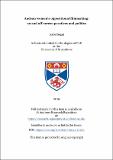Files in this item
Andean women's oppositional filmmaking : on and off-screen practices and politics
Item metadata
| dc.contributor.advisor | Torchin, Leshu | |
| dc.contributor.author | Seguí, Isabel | |
| dc.coverage.spatial | 298 p. | en_US |
| dc.date.accessioned | 2019-03-27T09:42:40Z | |
| dc.date.available | 2019-03-27T09:42:40Z | |
| dc.date.issued | 2019-06-24 | |
| dc.identifier.uri | https://hdl.handle.net/10023/17383 | |
| dc.description.abstract | This thesis examines the work of three women, active in the production of oppositional cinema in the Andes in the last third of the 20th century: Beatriz Palacios, María Barea and Domitila Chungara. A focus on women’s contributions is crucial for the examination of political film practices and politics in artisanal production contexts. However, to date, the privileging of auteurist and formalist approaches in Latin American political cinema scholarship —which foreground the products over the processes— has overshadowed women’s involvement and, also, the active and creative participation of indigenous and working-class subjects. To correct this gap and to restore the emancipatory and collective dimension of these cinematic practices —consistent with the decolonial principles of Latin American Third Cinema— I focus on women’s labour in production, distribution, and exhibition. To allow for the excavation of this hidden and complex scenario, I use oral histories, personal archives, and interviews—counter-sites to the domain of state archives, cinephilic journals, and auteurist scholarship. Inscribing Palacios, Barea and Chungara’s practices and politics into official history contributes not only to recover their figures but to situate the research field of Andean political cinema in a more rigorous framework of understanding. | en_US |
| dc.description.sponsorship | "This work was supported by the School of Philosophical, Anthropological and Film Studies of the University of St Andrews (Postgraduate Research Scholarship); Santander Universities (Santander 600 Scholarship and Santander St Leonard’s Scholarship); and the Society for Latin American Studies (Postgraduate Travel Grant)." -- Acknowledgements | en |
| dc.language.iso | en | en_US |
| dc.publisher | University of St Andrews | |
| dc.subject | Andean cinema | en_US |
| dc.subject | Bolivian cinema | en_US |
| dc.subject | Peruvian cinema | en_US |
| dc.subject | Latin American women filmmakers | en_US |
| dc.subject | Beatriz Palacios | en_US |
| dc.subject | María Barea | en_US |
| dc.subject | Domitila Chungara | en_US |
| dc.subject | Jorge Sanjinés | en_US |
| dc.subject | Ukamau | en_US |
| dc.subject | Feminist film history | en_US |
| dc.subject.lcc | PN1995.9W6S4 | |
| dc.subject.lcsh | Women motion picture producers and directors--Andes Region | en |
| dc.subject.lcsh | Women in motion pictures--Andes Region | en |
| dc.subject.lcsh | Motion pictures--Andes Region | en |
| dc.subject.lcsh | Motion pictures--Political aspects--Andes Region | en |
| dc.subject.lcsh | Azurduy-Palacios, Beatriz, 1952-2003 | |
| dc.subject.lcsh | Barea, Maria | |
| dc.subject.lcsh | Barrios de Chungara, Domitila | |
| dc.subject.lcsh | Grupo Ukamau | |
| dc.title | Andean women's oppositional filmmaking : on and off-screen practices and politics | en_US |
| dc.type | Thesis | en_US |
| dc.contributor.sponsor | University of St Andrews | en_US |
| dc.contributor.sponsor | Santander UK. Santander Universities | en_US |
| dc.type.qualificationlevel | Doctoral | en_US |
| dc.type.qualificationname | PhD Doctor of Philosophy | en_US |
| dc.publisher.institution | The University of St Andrews | en_US |
| dc.rights.embargoreason | Embargo period has ended, thesis made available in accordance with University regulations | en |
| dc.identifier.doi | https://doi.org/10.17630/10023-17383 |
This item appears in the following Collection(s)
Items in the St Andrews Research Repository are protected by copyright, with all rights reserved, unless otherwise indicated.

